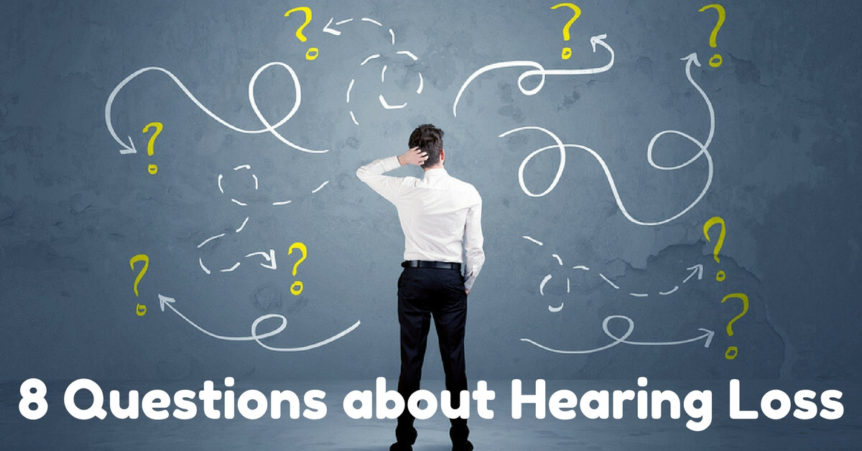As with all new experiences, the journey to better hearing health can be overwhelming. When you visit us at Custom Hearing Solutions, our audiologist and team of hearing specialists are here to support you through the process.
If you’ve been preparing for your consultation beforehand, you may have found an abundance of information and research on hearing loss. Here, we’ve compiled 10 questions you may have about hearing loss.
What type of hearing loss do I have?
The results of your hearing test will be mapped out in an audiogram, a visual representation of your hearing abilities. Your audiologist will be able to determine what type of hearing loss you have. There are three types of hearing loss: conductive, sensorineural, and mixed. Conductive involves the outer and middle ear, while sensorineural affects the inner ear, hair cells, and neural passages. Mixed hearing loss is a combination of both. Your audiologist will also identify the configuration and degree of your hearing loss.
Will a hearing instrument help me?
If a hearing loss is present, your audiologist will determine whether or not a hearing instrument will help you, based on the degree and type of hearing loss you experience. There is a wide range of options when it comes to hearing instruments, designed to many different features to treat varying degrees of hearing loss, from mild to profound.
Do I need to wear two hearing aids?
This depends on the type and degree of your hearing loss. For people who experience unilateral (single-sided) hearing loss, only one hearing aid is necessary. For people with bilateral hearing loss (both ears – the more common form), the prescription of two hearing aids is crucial to treating your hearing loss. It is a myth that one hearing aid will do the job. Two hearing aids work in tandem, mixing sounds from your environment to provide the most well-rounded listening experience. Your audiogram indicates hearing levels by ear, which will inform your audiologist on the best treatments for you.
Will a hearing aid worsen my hearing?
Quite the contrary! There’s a myth out there that hearing aids make your hearing worse, perhaps because they “play sounds at loud volumes” when amplifying sounds. This is simply untrue.
Hearing aids are intricate and precise instruments designed to enhance the sounds you want to hear. Furthermore, hearing aids are tailored to meet your specific hearing needs. Many studies have shown that wearing a hearing aid helps you hear better and preserve the auditory channels your brain has in place. Your audiologist will work with you to customize the best treatment.
Does diet or medication play a role in my hearing loss?
If you are on medication, remember to mention this to your audiologist when taking a hearing test. There are certain medications that have been linked to inner ear hair cell damage, which leads to hearing loss. For example, certain classes of antibiotics and chemotherapy drugs may be ototoxic (poisonous to the inner ear). If you have noticed changes in your hearing since starting medication, let your doctor know.
What can I do to protect my hearing?
Noise-induced hearing loss is a form of hearing loss that is 100% preventable. In many different areas of our lives, we may be exposed to damaging noise levels. Over time, lengthy exposure to loud noise could permanently damage our inner ear hair cells, which are responsible for translating sound waves into neural signals received by our brains as sound.
Hearing specialists recommend that we pay attention to noise levels in our daily activities. One way to prevent noise induced hearing loss is to follow the 60-60 rule: listen to music or media for only 60 minutes at a time, at 60% volume. Also, consider investing in custom ear protection, which do a better job at blocking noise than foam or silicone earplugs.
Will I need to make many lifestyle changes with a hearing aid?
Hearing aids are designed to be as seamless and discreet as possible, thus blending effortlessly into your life. Depending on your hearing aid, your audiologist will give you detailed instructions on when to wear them and when to take them out. Most hearing aids are sensitive to water, so you will have to remove them before a shower or swimming. Wearing a hearing aid may at first feel like a strange experience, after not hearing as clearly for some time. Your audiologist will give you advice on daily activities with your new hearing aid.
What kind of maintenance do I need to keep up with my hearing aid?
When you are fitted for new hearing aids, your audiologist will give you detailed instructions on care. Generally speaking, it is recommended that you remove hearing aids at night and keep them in a cool, dry place. If you use rechargeable hearing aids, you’ll want to have a reliable charging station to ensure that you wake up with fully charged batteries. Come visit us every few months for hearing aid tune ups.
For more information on hearing loss and treatment, contact us at Custom Hearing Solutions today.

